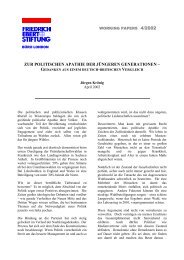Where Now for European Social Democracy? - Policy Network
Where Now for European Social Democracy? - Policy Network
Where Now for European Social Democracy? - Policy Network
Create successful ePaper yourself
Turn your PDF publications into a flip-book with our unique Google optimized e-Paper software.
Is the Lisbon Process Lost?ANGELICA SCHWALL-DÜRENThree years into the EU’s Lisbon economic re<strong>for</strong>m agenda, the<strong>European</strong> Union still remains far from achieving its goal of becomingthe “most dynamic and competitive knowledge-based economy in theworld by 2010”. Despite this, notable progress has been made at the<strong>European</strong> level in implementing many parts of the Lisbon agenda – suchas energy liberalisation, financial services integration and the adoptionof a Community Patent, though we are still waiting <strong>for</strong> the positiveeffects on growth and employment that were <strong>for</strong>ecast. Today it isquestionable whether we can meet the ambitious targets <strong>for</strong> reducingunemployment, raising employment rates <strong>for</strong> women and olderworkers and increasing expenditure on research and development tothe three per cent of GDP set at Lisbon.In view of the budget deficits in Germany, Portugal, France, Italyand The Netherlands, continuing slow growth rates and labour marketproblems – one might say that the Stability and Growth Pact ensuresneither stability nor growth and so call <strong>for</strong> changes to be made. ButI will not do so. Why?First, some remarks on the Stability and Growth Pact.At the <strong>European</strong> level, the rationale <strong>for</strong> the Stability and GrowthPact and the observance of sound fiscal rules in all the Eurozonecountries is as valid today as it was in 1997, when the Pact wascreated. If countries share a common currency, they need a set of keyrules <strong>for</strong> their fiscal policies and some kind of fiscal coordination.Without this, it could push up inflation and result in the ECB’s interestrates going higher than they otherwise would. Breaking the rules wouldalso send the wrong signal to the accession countries – showing that thecurrent Member States are unable to implement the necessary re<strong>for</strong>ms43



